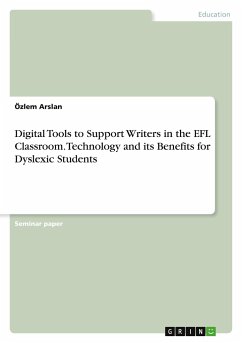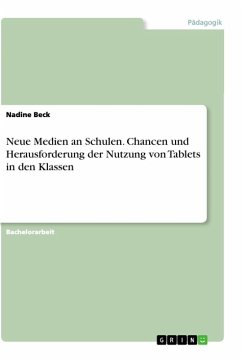
Digital Tools in the EFL Classroom. Teaching English as a Foreign Language
An Analysis of H5P in Relation to Theories of Language Teaching

PAYBACK Punkte
0 °P sammeln!
Bachelor Thesis from the year 2021 in the subject Didactics for the subject English - Miscellaneous, grade: 2,7, University of Dortmund, language: English, abstract: This thesis raises the questions why we need digitalization, what it can offer, and analyses how it can be implemented in the classroom. In order to answer this question thoroughly and analyse the software in great detail, the first chapter of this thesis lays the theoretical basis for some didactic theories. The second chapter provides insights on digitalization, in context with multiliteracies and the SAMR-model. In chapter thre...
Bachelor Thesis from the year 2021 in the subject Didactics for the subject English - Miscellaneous, grade: 2,7, University of Dortmund, language: English, abstract: This thesis raises the questions why we need digitalization, what it can offer, and analyses how it can be implemented in the classroom. In order to answer this question thoroughly and analyse the software in great detail, the first chapter of this thesis lays the theoretical basis for some didactic theories. The second chapter provides insights on digitalization, in context with multiliteracies and the SAMR-model. In chapter three, the analyzation of the software H5P answers the initially raised questions. The COVID-19 pandemic put the spotlight to schools and the school system in general. After 18 months of homeschooling and remote education it became obvious, that digitalization had not reached the classroom before and very little progress has been achieved until now. Even though theoretically digital tools were available, it lacked on a working infrastructure in schools in the sense of Wi-Fi, hardware or well-trained teachers. Whether it is for the missing devices as a result of the paperwork to apply for the ¿Digitalpakt Schule¿, because of the missing reasons to deal with digitalization in schools as such, or because the teachers are not trained enough to use them; digitalization in schools did not seem necessary, nor wanted, and that was no subject to change for a long time. In the last few years loads of books, training courses for teachers, congresses, blogs and tweets appeared and at least theoretically digitalization reached schools and classrooms. It seems that ¿digitalization in the English language classroom¿ has finally reached teacher education programs at universities and raises a whole new generation of teachers. Not only future teachers, but also current ones should be keen to know why years ago schools stopped to keep up with digitalization, why it needs to be implemented in schools, what it offers, where its limitations are and how traditional teaching methods can be modified into digital settings.













